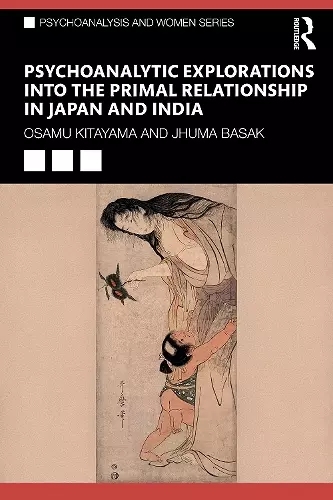Psychoanalytic Explorations into the Primal Relationship in Japan and India
Jhuma Basak author Osamu Kitayama author
Format:Paperback
Publisher:Taylor & Francis Ltd
Publishing:10th Jul '25
£31.99
This title is due to be published on 10th July, and will be despatched as soon as possible.

In this landmark collaboration, Osamu Kitayama and Jhuma Basak chronical their long-standing collaboration and cultural exchange to survey the importance of familial relationships in Japan and India, exploring primal relations through a cross-cultural psychoanalytic lens.
Divided into three sections, Psychoanalytic Explorations into the Primal Relationship in Japan and India looks at each country’s perception of parenthood and approach to raising children in turn before concluding in an illuminating dialogue between the two authors. Kitayama explores the maternal figure within the mother-child relationship, with a focus on the mother-son dyad, as well as relationships between parents. He considers, in depth, how Japanese culture can often exclude what is perceived as alien, delving into its rich tapestry of folklore to understand underlying ‘mental scripts’ which can shape collective perceptions, societal norms and expectations, each of which can pose an issue to healthy familial relationships. Basak’s response draws from Indian socio-cultural and mythological contexts, as well as clinical applications, to provide psychoanalytic insight into the stark differences and similarities between attitudes in Japan, India and the eastern culture at large. Both authors join together to highlight different child rearing practises such as co-sleeping and how they can shape human sexuality-subjectivity. Challenging the standardisation of the Oedipal myth, the book draws from literary and clinical examples in Japan and India to invite the reader into another world of parenting style and another idiom of psychoanalysis.
Uniquely positioned to develop understanding of how psychoanalysis has developed in non-Western countries, this book is an essential resource for psychoanalysts in training and in practice.
'Basak and Kitayama, experienced Indian and Japanese psychoanalysts, provide a brilliant model for the comparative study of psychoanalysis and culture. The themes they explore include mother-child dynamics; triadic relationships in the context of cultural practices; mythological symbolism as it relates to maternal sacrifice, guilt, and intense bonds between family members; shame culture; and the relationship between transience and resilience. A dialogue between Eastern and Western psychoanalytic traditions occurs that illuminates how family dynamics and cultural prohibitions differ, inform, and sometimes clash with each other. It is a profoundly interesting cross-cultural exploration for psychoanalysts, social scientists, and the general public.’
Harriet L. Wolfe, M.D., President, International Psychoanalytical Association
'The international psychoanalytic community will be both fascinated and deeply fertilised by this inspiring dialogue between an Indian and a Japanese analyst on fundamental issues of the human experience. Coming from two cultures so characterised, so rich in history, images and contents, they will contribute immensely to the future of psychoanalysis by opening up new scenarios and innovative ideas.’
Stefano Bolognini, Past President International Psychoanalytical Association
'This fascinating and historically important collection is an illuminating retrospective on the evolution of psychoanalysis in Japan and India. The artistic backgrounds of both authors brings their co-authorship together in an inspiring way. To read about some surprising convergences of the different cultures between India and Japan refreshes and advances both the practice and theory of psychoanalysis. Intriguing and stimulating I strongly recommend this book to all readers interested in the cultural impact on contemporary psychoanalysis.’
Jan Abram, Author of The Surviving Object: psychoanalytic clinical essays on psychic survival-of-the-object (2022) New Library of Psychoanalysis, Routledge.
ISBN: 9781032752044
Dimensions: unknown
Weight: unknown
280 pages